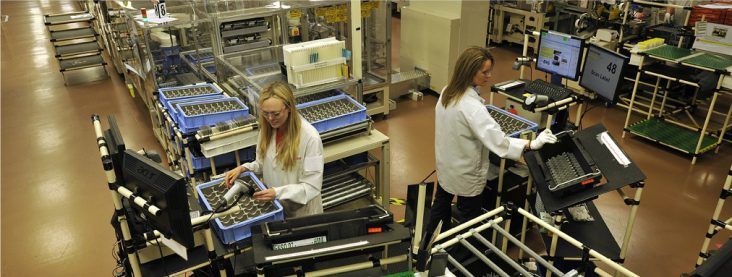Denso to spend $190 million to expand Tennessee plant with 320 new jobs
by February 28, 2018 10:40 am 1,506 views

Japanese auto supply giant Denso North America announced plans Wednesday (Feb. 28) to add four new production lines and 320 new jobs at its huge manufacturing complex in Athens, Tenn., that is closely aligned with company’s Northeast Arkansas operations.
Company officials said the investment will be partly funded by a profit windfall the Japanese auto parts giant received from the recent corporate tax reform legislation approved by Congress in December. In its third quarter earnings report in early February, parent company Denso Corp. did not reveal how much of its $2.7 billion in profits resulted from the tax cut proceeds.
The new $190 million capital outlay comes on top of a larger $1 billion investment announced by the Southfield, Mich.-based North American subsidiary of one of the world’s largest auto parts suppliers and developers of HVAC and electrification systems for the automobile industry.
“Increasing our capacity to manufacture products closer to customers in North America will continue to power Denso’s growth in the region,” said Hugh Cantrell, director of Administrative Services for Denso’s manufacturing operations near Knoxville. “This investment strengthens one of our key production centers. Athens has played a major role producing and supplying our customers with key components in fuel delivery, ignition, and exhaust gas systems.”
In September, Denso announced it was investing $1 billion in expanding a facility the Tennessee that would add about 1,000 new jobs, including high-paying technicians and engineer positions. Denso also announced a $400 million investment at the company’s affiliated Maryville, Tenn., location in 2015, adding 500 jobs and consolidating various warehouse operations into one central location.
Denso’s sprawling Tennessee operations in eastern Tennessee near Knoxville are part of the same supply chain as the Japanese auto parts giant’s state-of-the-art manufacturing facility in Osceola that employs nearly 500 workers and produces HVAC assemblies and Engine Cooling Modules (ECM) for the company’s North American customers.
Beside the expansion of its manufacturing operations with a total investment nearly $2 billion in the past three years, the world’s largest aftermarket supplier is also undergoing a global transformation to retool itself as a major technology developer of products that improve driver safety and innovation.
Over the past year, the parent Denso Corp. in Kariya, Japan, has made a dramatic companywide shift toward sustainability and reducing its environmental footprint by 2030. That overarching goal has led the Japanese automotive components giant to increase its investment in the U.S. in developing auto parts for environmentally-friendly cars and sophisticated vehicle safety and security systems.
For example, in late January, the Japanese automotive giant announced it will open a new office in Tokyo in April to conduct research and development activities on advanced driver assistance (ADAS), automated driving and connected vehicles. That emerging research and technology will be transferred to the U.S. where Denso manufacturers have partnerships with other Toyota-aligned companies, auto giants and industrial customers across the Midwest and Southeast U.S.
In addition, Denso has made numerous operational changes at its North American headquarters in Southfield to retool 28 consolidated subsidiaries and four affiliates across the U.S., Canada and Mexico.
According to company officials, the new investment will create new jobs across production, facility operations, engineering, administration and other skilled-trade positions. The Athens facility will soon debut one new production line for fuel injectors, low pressure fuel pumps, as well as two high pressure fuel pump production lines for its diverse North American customer base with clients such as Toyota, Honda, BMW, Mercedes-Benz, Freightliner, Harley-Davidson and Caterpillar.
Denso is also expected to have a significant role in the $1.6 billion Toyota-Mazda plant that is expected to employ 4,000 workers by 2021. According to preliminary details of that multi-billion-dollar project, that facility will allow the Japanese automakers to jointly develop electric vehicles and connected-car technologies and collaborate on advanced safety features in the U.S.
Although the Arkansas Economic Development Commission submitted a bid last year for the joint venture, the two Japanese auto giants announced earlier this year that the plant would be built in Alabama. Toyota still partly owns about 25% of Denso, which reported annual revenues exceeding $41 billion in 2017.
